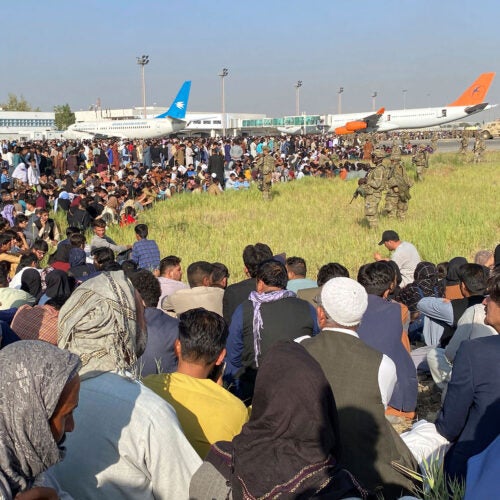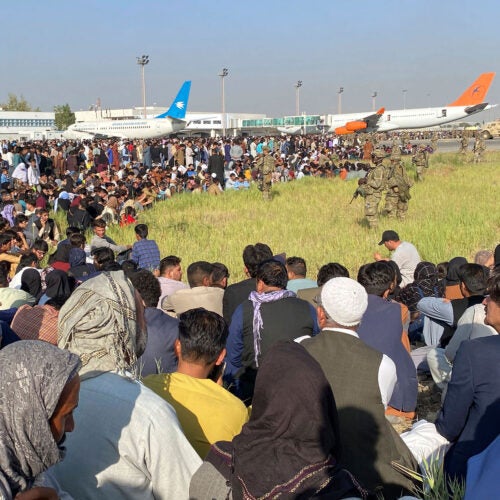Watching Taliban insurgents seize power in Afghanistan in the wake of the withdrawal of U.S. troops left Nazanin Azizian in anguish over the future of her home country.
“I have been emotional — in a state of grief, panic, helplessness, and anger,” said Azizian, a 2021 National Security Fellow at Harvard Kennedy School’s Belfer Center for Science and International Affairs.
Like many Afghan nationals who watched up-close or from afar the swift downfall of the Afghan government and the Taliban return to power on Aug. 15, Azizian fears life under the Islamic fundamentalist group, which is known for the enforcement of strict Islamic law and repressive policies toward women and girls.
“I am deeply concerned about the generations of Afghans who know nothing but war,” said Azizian, whose family fled Afghanistan in 1993, when she was 8 years old, and settled in Northern Virginia.
Over the last two decades while the U.S.-backed Afghan government was in power, women there made gains in education, employment, and political participation. Azizian, who has a doctorate in systems engineering and now works at the Pentagon as a national security expert in defense and military intelligence, worries that all those hard-won advances could be lost.
“I am deeply concerned about Afghans who will relinquish their educational and career achievement over the last 20 years under the oppression of a twisted, misogynist, authoritarian, fundamentalist Islamic regime that actually insults our faith,” said Azizian. “I am deeply concerned about public execution and humiliation of women, closings of girls’ schools, barring of women from work, increased domestic violence, and child marriages.”
Azizian’s family experienced firsthand the rule of the mujahideen, the Islamic guerrillas who overthrew the pro-Soviet Afghan regime in 1992. The Taliban would eventually emerge from the ranks of that group and run the country.
Although Azizian was only 7 years old, she still remembers the violence and chaos of the day when a group she refers to as the “terrorists” took control of Kabul after the Soviets withdrew.
“Bloodshed during the days that followed forced my family and me to take cover in a small bathroom, away from the windows,” Azizian wrote in an email interview. “For days we were without electricity and water while hearing around-the-clock bombs, rockets, and gunfire. Afghanistan changed from those days onward in a way that was unrecognizable for us, but unfortunately defined how the world came to know it under the Taliban…
“The terrorists banned concerts, music, and wedding celebrations, and we became habituated to the explosion of bombs, rockets, and other weapons raining death all around us. The terrorists committed brutalities such as breaking into people’s homes, killing innocent people, and abusing women.”
There was political warring among mujahideen leaders. Eventually the Taliban movement, largely led by young ultraconservative seminarians, took control and established its own harsh version of Islamic law. That government was toppled by the U.S. invasion in 2001 in the wake of the Sept. 11 terror attacks and the hunt in the region for Osama bin Laden.
Today, uncertainty is fueling concerns among Afghans and international observers about what life will be like under the new Taliban takeover. Azizian, who doesn’t have any close family in Afghanistan, hopes for peace, stability, and a government for Afghans and by Afghans.
“I hope for Afghanistan that it will someday be governed by a stable, inclusive, and democratic government that resists ethnic fracture, governs accountably, and upholds the rights of women,” she said.
Unlike Azizian, Awnit Singh Marta ’20 doesn’t have memories of life in Afghanistan — he was less than a month old when his family immigrated to The Netherlands in 1998, fleeing religious persecution. Marta’s family are practicing Sikhs, a minority religious group in Afghanistan. They hold memories of good times and hard times.
“My mother always talks about how beautiful, open, and green Afghanistan was, and how people used to go to the temple in the mornings and how families cooked and shared meals together,” said Marta, who graduated with a degree in electrical engineering. “But it turned into a violent place, where people had to seek shelter from the bombs, either inside the temple or inside the house.”
Under the mujahideen, who ruled Afghanistan in the 1990s, ordinary life for Sikhs became increasingly hard in a Muslim country. When a neighbor’s home was shelled to the ground, Marta’s family decided to flee.
Marta and his family worry about the Sikhs’ situation under Taliban rule. In a video widely circulated in Afghanistan, Taliban militants assured Sikh leaders that they would be allowed to practice their faith without fear of punishment, but Marta said there is no certainty that will happen.
Sikhs who fear persecution might want to leave Afghanistan and they should be allowed to do so, Marta said. He hopes that the U.S. government and others will take in Afghan refugees, including those who didn’t work for the U.S.-backed Afghan government.
Like many Afghans and international observers, Marta is critical of the U.S. government’s lack of a well-planned exit strategy from Afghanistan. He said he remains hopeful that the Taliban keep its pledge of setting up a “moderate” government, but he worries about the possible loss of 20 years of progress.
“We’re basically back where we were 20 years ago, except that the Taliban now is apparently taking a more moderate approach,” said Marta. “Plus, we have the rise of social media, which means that there could be slightly more accountability. But if the goal was to get rid of the Taliban 20 years ago, we’re basically back at square one.”


